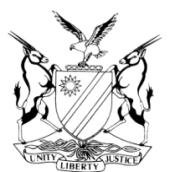3
REPUBLIC OF NAMIBIA

IN THE HIGH COURT OF NAMIBIA, NORTHERN LOCAL DIVISION,
HELD AT OSHAKATI
REVIEW JUDGMENT
Case Title: S v Prodesia Minikileni | Case no: CR 33/2022 | |
Division of Court: Northern Local Division | ||
Heard before: Honourable Ms. Justice Salionga J et Honourable Mr. Justice Kesslau AJ | Delivered on: 27 July 2022 | |
Neutral citation: S v Minikileni (CR 33/2022) [2022] NAHCNLD 72 (27 July 2022) | ||
IT IS ORDERED THAT:
The accused is sentenced to 12 (twelve) months imprisonment wholly suspended for a period of 5 years on condition that the accused is not convicted of contravening section 254(1)(b) of the Child Care and Protection Act, 3 of 2015 committed during the period of suspension. | ||
Reasons for the above order: | ||
SALIONGA J (KESSLAU AJ concurring): [1] The accused was charged with the offence of contravening section 254(1) (b) of the Child Care and Protection Act, 3 of 2015- Abandoning a child. She was convicted as charged following her guilty plea and questioning in terms of section 112 (1) (b) of the Criminal Procedure Act, 51 of 1977 as amended (CPA). [2] The reviewing Judge saw no need to query the Magistrate in this regard taking into account the implication any amendment would have on the actual sentence and the period that has passed since the matter was finalized. [3] The accused was properly convicted. However, the condition of the suspended sentence poses a problem. The use of words ‘any offence under the Child Care and Protection Act 3 of 2015’ in the suspended sentence is too wide, vague and uncertain. [4] It is a requirement that a suspended sentence must be clear and unambiguous so that an accused can know precisely what prohibited act will attract the risk of the suspended sentence being put into operation. Any condition of suspension that fails to meet this criteria renders the sentence incompetent. I find the following criteria for a suspended sentence as set out by O’linn J with Frank J compelling: ‘A condition of suspension must comply with the following two requisites: 1. It must be related to the offence or crime in question, i.e. it must not be so wide that it has no nexus with the offence concerned. 2. It must be clear and the accused should know exactly what conduct may lead to his having to serve the sentence.’ 1 [5] No doubt that most of the statutes or Acts of parliament that creates offences are difficult to comprehend for any ordinary person. Accused, most of which are without any background of legal training and in most cases with no knowledge of the deep legal jargon can only receive a fair trial in this regard if the conditions of suspension are clearly and unambiguously explained by the courts. In addition, the process of statutory interpretation is one that comes with juridical understanding of legislation that deals with those rules and principles which are to be applied in practical situations. When a court imposes a suspended sentence, or any sentence, it is expected that an ordinary person is able to make sense of the total relevant legislative scheme applicable to his situation. Failure to do this only extends the above highlighted quandary and should be discouraged. [6] In its current form the suspended sentence as imposed by the Magistrate cannot be allowed to stand and as such must be varied. [7] In the result the following orders are made:
The accused is sentenced to 12 (twelve) months imprisonment wholly suspended for a period of 5 years on condition that the accused is not convicted of contravening section 254(1)(b) of the Child Care and Protection Act, 3 of 2015 committed during the period of suspension. | ||
J. T. SALIONGA JUDGE | E. E. KESSLAU ACTING JUDGE | |
1 S v Skrywer 1990 NR 343 (HC).